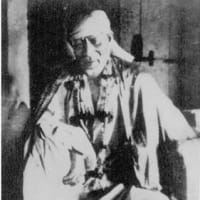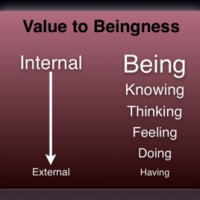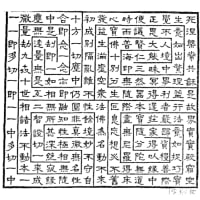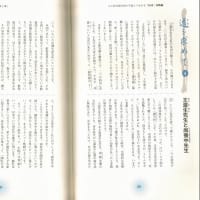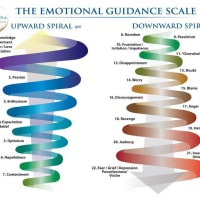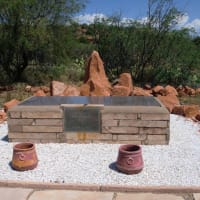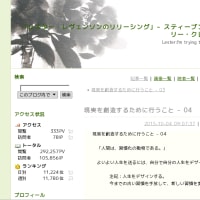完全な自由と悟りの段階 (悟りの階梯) - 02
悟りの段階 (悟りの階梯)
不還果 (ふげんか) - (◎『悟りが進むと輪廻が減る』)
一来果を超えて不還果に達するためには、最低もう一度だけ「無我」を「体験」しないといけません。でも一来果に達した修行者が次に不還果に達する時は、ほとんどの場合、瞑想に習熟して禅定に入り、禅定の世界・梵天界を体験しています。一瞬の「無我」だけでなく圧倒的な禅定体験が、不還果に達する鍵になります。
天と梵天の違い-梵天は色界・無色界の生命-
瞑想に習熟して、目や耳などの五感に頼らない、しかも六番目の感覚・心で考える妄想も全くない、心が純粋にはたらくだけの状態に達したら、それが禅定です。身体も妄想概念も全部切り離して、心だけが穏やかに生滅し続けます。
この禅定状態も、悟りではなく、輪廻の世界です。心が全ての感覚から離れただけで、心はずーっと流れ続けますが、そのエネルギーが尽きて滅するわけではありません。禅定から起って、心の概念を含めた六感の世界に戻ると、元通りの身体や概念が戻ってきます。禅定状態は、煩悩を滅して智慧が現れる悟りの状態ではなく、煩悩が、その間だけは単にはたらいていない、ただの煩悩休止状態なのです。
不還果では五下分結が消える
不還果に達したほとんどの人が禅定に入って梵天界を体験し、そうでなくても三度目の「無我」を「体験」し、身体で感覚を味わう欲界への執着だけは完全に消えてしまいます。欲界への執着が完全に消えますので、不還果では心を欲界に結び付ける五種類の執着・五下分結が全て消えると言います。下分結とは、下の境涯・欲界に結び付ける煩悩ということです。その五つとは何でしょうか? 千五百種類もの執着・煩悩の中、欲界に対する執着をたった五つにまとめて消し去るからには、あっと驚くものであって欲しいものです。
ところが五下分結とは、預流果で既に消え、一来果でも既に消えていると再確認された有身見、疑、戒禁取の三結と、後の二つは、激しい欲、激しい怒りだけです。無知の中では相変わらずの三結と、欲と怒りの中では激しいものが消えるだけなのです。これでは『欲、怒り、無知が弱まる』と言われた一来果と、ほとんど変わりません。
でも、決定的に違う点があるのです。一来果では弱まるだけだった下界・欲界への執着・煩悩が、不還果では完全に消えていることです。不還者の心にはもはや俗世間に対する欲も怒りもありませんから、この世界に関する全てのことに、心はもう揺れません。ただ淡々と日常生活の仕事をこなして過ごすだけです。お腹が空いたら、身体を維持するためにだけ何かを取り入れる、誰と何があっても、仏教のこと以外なら自分がすぐに引いて他者を許し、自分を懺悔するのです。この世への執着が全く消えた分、智慧がかなり大胆に現れますから、他の生命に対する慈悲に溢れた、心静かな聖者という感じになります。
その代わり不還果では、もともと禅定を嗜んでいた人は梵天界への執着だけは残ります。あるいは、一来果まで禅定に達せずにいた人には、梵天界を体験して不還果に達したことで、梵天界への執着が新たに生まれます。三度目の「無我」を「体験」して不還果に達した人も、欲界への執着は消えますが、まだ完全に滅するには踏み切れず、欲界でない清らかな状態への執着が生まれます。この執着を色界への欲・色貪と無色界への欲・無色貪と言います。
不還果に達すると梵天界に生まれる
不還果に達した人は欲界への執着が消えていますから、死後には欲界のどこにも生まれ変わりません。地獄などの三悪趣はもとより、欲界天にも人界にも輪廻しないのです。この欲の世界にもはや決して帰らないので、「不還」と呼ばれます。
注記:不還果に達した人は欲界への執着が消えています。
欲界への執着:エゴとマインドの状態 (無気力・悲しみ・恐れ・渇望・怒り・誇りの 6つの状態 (AGFLAP の状態)。自我・個人という概念に固執・執着している状態。
欲界への執着が消えています。:無我の状態。自我・個人という概念がない状態。
----------
参考サイト:
ゴール・セッティング (バット・システム) のまとめ - 03 - 恐れと心配の克服
2013-05-24 22:40:36 | releasing
Overcoming Fear and Anxiety – 恐れと心配の克服?
2013-02-17 08:34:43 | Sedona Method
-----
感情のチャート (プライドから、無気力へと下降する)
PRIDE / プライド
ANGER / 怒り
LUST / 渇望
FEAR / 恐れ
GRIEF / 悲しみ
APATHY / 無気力
-----
エゴとマインドの状態 (無気力・悲しみ・恐れ・渇望・怒り・誇りの 6つの状態(AGFLAP の状態))
感情のチャートの(図表の) 否定的な部分 / AGFLAP
APATHY / 無気力、GRIEF / 悲しみ、FEAR / 恐れ、LUST / 渇望、ANGER / 怒り、PRIDE / プライド、
問題に集中している状態。(問題の原因を理解しようとしている状態。問題を解きたいと集中している状態。)
-----
全ては、Having, Doing, Being, の状態です。
2013-05-04 18:20:45 | Sedona Method
-----
How to Manifest What You Need, (あなたが必要とするものを明らかにする方法、) - 02
2013-03-30 11:43:08 | Sedona Method
"To know the infinite Being that you are, to know what it's like beyond creation, you must transcend the mind. The final state is beyond creation. It is the changeless state. In creation, everything is constantly changing, and therefore the ultimate Truth cannot be there.
「あなたが、それである無限なる存在を知るためには、それは生成 (創造) を超えてどのようなものかを知って、あなたの心を超越しなければなりません。
最終状態は生成 (創造) を超えています。
それは一定の状態です(それは不変の状態です)。
生成 (創造) では、すべては絶えず変わっています。したがって、根本的真理はそこにありえません。
----------
不還果に達した人は、自己が消滅しています。無自己を経験します。
過去、未来にとらわれなくなります。今に集中します。
----------
参考サイト:
Bernadette Roberts (バーナデット・ロバーツ) 1931~ (03)
2013-06-10 01:07:31 | 話題 (opinion)
----------
Bernadette Roberts' The Experience of No-Self is a remarkable and valuable book. It is an account of an inner journey she went on after many years of trying to live out the Catholic contemplative life, a journey that ended in what she called the experience of no-self. But this very word no-self and an attentive reading of her description of her experiences reveal an inner structure and language that is much closer to Buddhist enlightenment than Christian mystical union, a fact made all the more interesting because the author was not trying to explain herself in Buddhist categories.
バーナデット・ロバーツの無自己の経験は著しいおよび貴重書です。
カトリック静観的な人生(自身の経験と言わなかったことで終わった旅行)を送ろうとする長年の後、彼女が続けたことは、内部の旅行の報告です。
自身と彼女の経験の彼女の説明の気を配る読書で内部の構造が現れないというこのまさしく知らせとキリスト教神秘的な組合より仏教啓蒙に非常に近い言語以外の、著者が仏教カテゴリーで自分の立場を弁明しようとしていなかったので、事実はいっそう面白くなりました。
----------
Bernadette Roberts (バーナデット・ロバーツ) 1931~ (04)
2013-06-10 03:31:14 | 話題 (opinion)
----------
バーナデット・ロバーツ
話が逸れるが、私自身はこのバーナデット・ロバーツの本を読んだのは2ヶ月ほど前のことである。以前から彼女の本のことは知っていたが、数年前より絶版になっており、手に入らなかった。それが、つい最近、2,3ヶ月前のことだが、私のホームページを通じてある方とご縁ができ、その方から先の本をお借りすることができた。
----------
Bernadette Roberts (バーナデット・ロバーツ) 1931~ (06 - 1)
2013-06-12 20:51:35 | 話題 (opinion)
Awakening to Reality: Bernadette Roberts Interview
現実に起きること:
バーナデット・ロバーツ・インタビュー
Bernadette Roberts Interview
Posted by: Wei Yu
Jul 04 2007
Bernadette Roberts (バーナデット・ロバーツ) 1931~ (06 - 3 - 2)
2013-06-16 02:10:46 | 話題 (opinion)
Awakening to Reality: Bernadette Roberts Interview
現実に起きること:
バーナデット・ロバーツ・インタビュー
Bernadette Roberts Interview
Posted by: Wei Yu
Jul 04 2007
前の内容:
Bernadette Roberts (バーナデット・ロバーツ) 1931~ (06 - 1)
2013-06-12 20:51:35 | 話題 (opinion)
Bernadette Roberts (バーナデット・ロバーツ) 1931~ (06 - 2)
2013-06-12 21:41:44 | 話題 (opinion)
Bernadette Roberts (バーナデット・ロバーツ) 1931~ (06 - 3 - 1)
2013-06-12 21:47:44 | 話題 (opinion)
Stephan: How did you discover the further stage, which you call the experience of no-self?
ステファン:どのように一層の段階(それを無自己の経験と呼ぶ)を発見しましたか。?
Bernadette: That occurred unexpectedly some 25 years after the transforming process. The divine center - the coin, or "true self" - suddenly disappeared, and without center or circumference there is no self, and no divine. Our subjective life of experience is over - the passage is finished. I had never heard of such a possibility or happening. Obviously there is far more to the elusive experience we call self than just the ego. The paradox of our passage is that we really do not know what self or consciousness is, so long as we are living it, or are it. The true nature of self can only be fully disclosed when it is gone, when there is no self.
バーナデット:それが、変換プロセスの約25年後に、予想外に起こりました。神センター - コイン、あるいは "本当の自分"は - 突然消えておらず、センターまたは円周なしでは自己は存在しない、とない神。経験の私達の主観的な生活は終わった - 通路が仕上がっています。私はそのような可能性や出来事のことを聞いたことがなかった。明らかに我々がちょうど自我も自己呼び出しとらえどころのない経験にはるかがあります。私たちの通路のパラドックスは、我々が本当に何か自己意識がある限り、我々はそれを生きているように、であるか、またはそれであるかわからないということです。それがなくなったときに、自己が存在しない場合は自己の本質は、完全に、開示することができます。
One outcome, then, of the no-self experience is the disclosure of the true nature of self or consciousness. As it turns out, self is the entire system of consciousness, from the unconscious to God-consciousness, the entire dimension of human knowledge and feeling-experience. Because the terms "self" and "consciousness" express the same experiences (nothing can be said of one that cannot be said of the other), they are only definable in the terms of "experience". Every other definition is conjecture and speculation. No-self, then, means no-consciousness. If this is shocking to some people, it is only because they do not know the true nature of consciousness. Sometimes we get so caught up in the content of consciousness, we forget that consciousness is also a somatic function of the physical body, and, like every such function, it is not eternal. Perhaps we would do better searching for the divine in our bodies than amid the content and experience of consciousness.
一つの結果は、その後、無自己経験の自己意識の本質の開示である。結局のところ、自己は無意識から神の意識、人間の知識と感情体験の全体の寸法に、意識の全体のシステムです。用語は、 "自己"と "意識"が同じ経験(何も他に言うことができない1の言うことができない)を発現するので、彼らは "経験"の観点でのみ定義可能です。他のすべての定義は、推測や憶測である。無自己、その後、無意識しないことを意味します。これは一部の人々に衝撃的である場合、彼らは意識の本質を知らないので、それだけです。時には、我々はそう意識の内容に巻き込ま、私たちは、その意識はまた身体の体関数であり、かつ、すべてのそのような機能のように、それが永遠ではないことを忘れない。おそらく、我々は意識の内容や経験の中でも、私たちの体で神のためのより良い検索を行うだろう。
Stephan: How does one move from "transforming union" to the experience of no-self? What is the path like?
ステファン:1つは、どのように「結合を変形する」ことから無自己の経験まで移りますか?パスはどのようなものですか?
Bernadette Roberts (バーナデット・ロバーツ) 1931~ (06 - 3 - 3)
2013-06-19 07:03:36 | 話題 (opinion)
Initially, when I looked into Buddhism, I did not find the experience of no-self there either; yet I intuited that it had to be there. The falling away of the ego is common to both Hinduism and Buddhism. Therefore, it would not account for the fact that Buddhism became a separate religion, nor would it account for the Buddhist's insistence on no eternal Self - be it divine, individual or the two in one. I felt that the key difference between these two religions was the no-self experience, the falling away of the true Self, Atman-Brahman. Unfortunately, what most Buddhist authors define as the no-self experience is actually the no-ego experience.
The cessation of clinging, craving, desire, the passions, etc., and the ensuing state of imperturbable peace and joy articulates the egoless state of oneness; it does not, however, articulate the no-self experience or the dimension beyond.
Unless we clearly distinguish between these two very different experiences, we only confuse them, with the inevitable result that the true no-self experience becomes lost.
If we think the falling away of the ego, with its ensuing transformation and oneness, is the no-self experience, then what shall we call the much further experience when this egoless oneness falls away?
In actual experience there is only one thing to call it, the "no-self experience"; it lends itself to no other possible articulation.
当初、私は仏教に見たとき、私はどちらかが存在しない自己の経験を見つけられませんでした、まだ私はそれが存在しなければならなかったことを直感。自我を離れて落下するとヒンドゥー教と仏教の両方に共通です。したがって、仏教が別の宗教になったという事実を説明できないであろう、また、それは永遠の自己に仏教の主張を占めるであろう - それは、神の個人または1つで2つのこと。私はこれらの2つの宗教の重要な違いは、真の自己の無自己経験、落下離れて、アートマン·ブラフマンと感じました。残念なことに、どのようなほとんどの仏教の著者は、無自己経験として定義すると、実際に、無自我経験です。
しがみついて、渇望、欲望の停止は、情熱などと動じない平和と喜びのその後の状態は、ワンネスの状態を明確に表現egoless、それは、しかし、自己の経験や超えた次元を明確にしていません。
もし明白にこれらの非常に異なる2つの経験を識別しなければ、私たちは単にそれらを避けられなく混同するので、真実の無自己経験は、失われるようになります。
自我の落ちることが、その引き続いて起こる変化と一致で、無自己経験であると我々が思うならば、この自我のない一致が落ちるとき、それから、我々は何を非常に更なる経験と言いますか?
実際の経験において、それ(「無自己経験」)を呼ぶ1つのものだけが、あります;
それは、他のいかなるありうる発音にも向きません。
Initially, I gave up looking for this experience in the Buddhist literature.
Four years later, however, I came across two lines attributed to Buddha describing his enlightenment experience.
Referring to self as a house, he said, "All thy rafters are broken now, the ridgepole is destroyed."
And there it was - the disappearance of the center, the ridgepole; without it, there can be no house, no self.
When I read these lines, it was as if an arrow launched at the beginning of time had suddenly hit a bulls-eye. It was a remarkable find.
These lines are not a piece of philosophy, but an experiential account, and without the experiential account we really have nothing to go on.
In the same verse he says, "Again a house thou shall not build," clearly distinguishing this experience from the falling away of the ego-center, after which a new, transformed self is built around a "true center," a sturdy, balanced ridgepole.
当初、私は仏教の文献でこの経験を探すことをあきらめた。
四年後、しかし、私は、彼の悟りの経験を記述した仏に起因する二行に出くわした。
自己を家と呼んで、彼は、「汝の垂木はすべて今壊れています。梁材が破壊されます」と言いました。
そしてそれがあった。 - 中心の消失 ; それなしで、全く自己(全く家)はありえない。
(そして、それはそこにありました。 ― センター(梁材)の消失 ― ;
それなしで、家(自己でない)があることができません。)
時間の初めに開始した矢印が、突然雄牛の目を打ったかのように、私はこれらの行を読んだとき、それがあった。それは著しい発見でした。
(それは、注目に値する発見でした。)
これらの行は哲学の一部ですが、経験上のアカウントです。また、経験上のアカウントなしで、私たちには、実際に進むものは何もありません。
(これらの行は哲学でなく、経験の利益です。そして、経験の利益なしで、我々は続く何も本当に持ちません。)
彼が言う同じ韻文(詩)では、「また、住宅汝は、造ってはいけません。そして」、明らかにこの経験と自我-センターの落ちることを区別します、そしてその後、新しい、変わる自身は「本当のセンター」(丈夫な、バランスのよい梁材)のまわりで造られます。
Bernadette Roberts (バーナデット・ロバーツ) 1931~ (07)
2013-06-19 19:15:38 | 話題 (opinion)
The Real Truth of Life: The Experience of No-self
人生の真相:
無自己の経験
The Experience of No-self by Bernadette Roberts
It's a true story of how one can achieve the cessation of self (one of the important characteristics of people who are free)
それは、人が自己(自由である人々の重要な特徴の一つ)の停止をどのように成し遂げることができるかという実話です。
Bernadette Roberts was born in the pious Catholic family in the state of California, USA
バーナデット・ロバーツは、カリフォルニア州(USA)で、信心深いカトリック家族で生まれました。
Since childhood she has the talent to meditate, sit quietly in his room. Father & mother of Bernadette encourage this talent.
幼児期から、彼女には、瞑想して、静かにその部屋に位置するために、才能があります。
バーナデットの父と母は、この才能を促します。
At age 15 she entered the monastery, became a nun. The goal is to develop the talents of meditation.
15歳で、彼女は修道院に入って、修道女になりました。
ゴール(目標)は、瞑想の才能を高めることです。
According to the teachings of Christian mysticism, the goal of meditation is to unite with God. That is the ultimate goal. There is still 'self', it's just that at its peak, 'self' is not separate from God.
キリスト教の神秘主義の教えによると、瞑想のゴールは、神と結びつくことになっています。
それは、究極のゴールです。
静かな『自己』があります、そのピークで、『自己』が神と別でないことは当然です。
(キリスト教の神秘主義の教えによれば、瞑想のゴールは神と結合することです。
それは究極のゴールです。
「自己」がまだいます。ピークに、「自己」が神と離れていないことは正当です。)
悟りの段階 (悟りの階梯)
不還果 (ふげんか) - (◎『悟りが進むと輪廻が減る』)
一来果を超えて不還果に達するためには、最低もう一度だけ「無我」を「体験」しないといけません。でも一来果に達した修行者が次に不還果に達する時は、ほとんどの場合、瞑想に習熟して禅定に入り、禅定の世界・梵天界を体験しています。一瞬の「無我」だけでなく圧倒的な禅定体験が、不還果に達する鍵になります。
天と梵天の違い-梵天は色界・無色界の生命-
瞑想に習熟して、目や耳などの五感に頼らない、しかも六番目の感覚・心で考える妄想も全くない、心が純粋にはたらくだけの状態に達したら、それが禅定です。身体も妄想概念も全部切り離して、心だけが穏やかに生滅し続けます。
この禅定状態も、悟りではなく、輪廻の世界です。心が全ての感覚から離れただけで、心はずーっと流れ続けますが、そのエネルギーが尽きて滅するわけではありません。禅定から起って、心の概念を含めた六感の世界に戻ると、元通りの身体や概念が戻ってきます。禅定状態は、煩悩を滅して智慧が現れる悟りの状態ではなく、煩悩が、その間だけは単にはたらいていない、ただの煩悩休止状態なのです。
不還果では五下分結が消える
不還果に達したほとんどの人が禅定に入って梵天界を体験し、そうでなくても三度目の「無我」を「体験」し、身体で感覚を味わう欲界への執着だけは完全に消えてしまいます。欲界への執着が完全に消えますので、不還果では心を欲界に結び付ける五種類の執着・五下分結が全て消えると言います。下分結とは、下の境涯・欲界に結び付ける煩悩ということです。その五つとは何でしょうか? 千五百種類もの執着・煩悩の中、欲界に対する執着をたった五つにまとめて消し去るからには、あっと驚くものであって欲しいものです。
ところが五下分結とは、預流果で既に消え、一来果でも既に消えていると再確認された有身見、疑、戒禁取の三結と、後の二つは、激しい欲、激しい怒りだけです。無知の中では相変わらずの三結と、欲と怒りの中では激しいものが消えるだけなのです。これでは『欲、怒り、無知が弱まる』と言われた一来果と、ほとんど変わりません。
でも、決定的に違う点があるのです。一来果では弱まるだけだった下界・欲界への執着・煩悩が、不還果では完全に消えていることです。不還者の心にはもはや俗世間に対する欲も怒りもありませんから、この世界に関する全てのことに、心はもう揺れません。ただ淡々と日常生活の仕事をこなして過ごすだけです。お腹が空いたら、身体を維持するためにだけ何かを取り入れる、誰と何があっても、仏教のこと以外なら自分がすぐに引いて他者を許し、自分を懺悔するのです。この世への執着が全く消えた分、智慧がかなり大胆に現れますから、他の生命に対する慈悲に溢れた、心静かな聖者という感じになります。
その代わり不還果では、もともと禅定を嗜んでいた人は梵天界への執着だけは残ります。あるいは、一来果まで禅定に達せずにいた人には、梵天界を体験して不還果に達したことで、梵天界への執着が新たに生まれます。三度目の「無我」を「体験」して不還果に達した人も、欲界への執着は消えますが、まだ完全に滅するには踏み切れず、欲界でない清らかな状態への執着が生まれます。この執着を色界への欲・色貪と無色界への欲・無色貪と言います。
不還果に達すると梵天界に生まれる
不還果に達した人は欲界への執着が消えていますから、死後には欲界のどこにも生まれ変わりません。地獄などの三悪趣はもとより、欲界天にも人界にも輪廻しないのです。この欲の世界にもはや決して帰らないので、「不還」と呼ばれます。
注記:不還果に達した人は欲界への執着が消えています。
欲界への執着:エゴとマインドの状態 (無気力・悲しみ・恐れ・渇望・怒り・誇りの 6つの状態 (AGFLAP の状態)。自我・個人という概念に固執・執着している状態。
欲界への執着が消えています。:無我の状態。自我・個人という概念がない状態。
----------
参考サイト:
ゴール・セッティング (バット・システム) のまとめ - 03 - 恐れと心配の克服
2013-05-24 22:40:36 | releasing
Overcoming Fear and Anxiety – 恐れと心配の克服?
2013-02-17 08:34:43 | Sedona Method
-----
感情のチャート (プライドから、無気力へと下降する)
PRIDE / プライド
ANGER / 怒り
LUST / 渇望
FEAR / 恐れ
GRIEF / 悲しみ
APATHY / 無気力
-----
エゴとマインドの状態 (無気力・悲しみ・恐れ・渇望・怒り・誇りの 6つの状態(AGFLAP の状態))
感情のチャートの(図表の) 否定的な部分 / AGFLAP
APATHY / 無気力、GRIEF / 悲しみ、FEAR / 恐れ、LUST / 渇望、ANGER / 怒り、PRIDE / プライド、
問題に集中している状態。(問題の原因を理解しようとしている状態。問題を解きたいと集中している状態。)
-----
全ては、Having, Doing, Being, の状態です。
2013-05-04 18:20:45 | Sedona Method
-----
How to Manifest What You Need, (あなたが必要とするものを明らかにする方法、) - 02
2013-03-30 11:43:08 | Sedona Method
"To know the infinite Being that you are, to know what it's like beyond creation, you must transcend the mind. The final state is beyond creation. It is the changeless state. In creation, everything is constantly changing, and therefore the ultimate Truth cannot be there.
「あなたが、それである無限なる存在を知るためには、それは生成 (創造) を超えてどのようなものかを知って、あなたの心を超越しなければなりません。
最終状態は生成 (創造) を超えています。
それは一定の状態です(それは不変の状態です)。
生成 (創造) では、すべては絶えず変わっています。したがって、根本的真理はそこにありえません。
----------
不還果に達した人は、自己が消滅しています。無自己を経験します。
過去、未来にとらわれなくなります。今に集中します。
----------
参考サイト:
Bernadette Roberts (バーナデット・ロバーツ) 1931~ (03)
2013-06-10 01:07:31 | 話題 (opinion)
----------
Bernadette Roberts' The Experience of No-Self is a remarkable and valuable book. It is an account of an inner journey she went on after many years of trying to live out the Catholic contemplative life, a journey that ended in what she called the experience of no-self. But this very word no-self and an attentive reading of her description of her experiences reveal an inner structure and language that is much closer to Buddhist enlightenment than Christian mystical union, a fact made all the more interesting because the author was not trying to explain herself in Buddhist categories.
バーナデット・ロバーツの無自己の経験は著しいおよび貴重書です。
カトリック静観的な人生(自身の経験と言わなかったことで終わった旅行)を送ろうとする長年の後、彼女が続けたことは、内部の旅行の報告です。
自身と彼女の経験の彼女の説明の気を配る読書で内部の構造が現れないというこのまさしく知らせとキリスト教神秘的な組合より仏教啓蒙に非常に近い言語以外の、著者が仏教カテゴリーで自分の立場を弁明しようとしていなかったので、事実はいっそう面白くなりました。
----------
Bernadette Roberts (バーナデット・ロバーツ) 1931~ (04)
2013-06-10 03:31:14 | 話題 (opinion)
----------
バーナデット・ロバーツ
話が逸れるが、私自身はこのバーナデット・ロバーツの本を読んだのは2ヶ月ほど前のことである。以前から彼女の本のことは知っていたが、数年前より絶版になっており、手に入らなかった。それが、つい最近、2,3ヶ月前のことだが、私のホームページを通じてある方とご縁ができ、その方から先の本をお借りすることができた。
----------
Bernadette Roberts (バーナデット・ロバーツ) 1931~ (06 - 1)
2013-06-12 20:51:35 | 話題 (opinion)
Awakening to Reality: Bernadette Roberts Interview
現実に起きること:
バーナデット・ロバーツ・インタビュー
Bernadette Roberts Interview
Posted by: Wei Yu
Jul 04 2007
Bernadette Roberts (バーナデット・ロバーツ) 1931~ (06 - 3 - 2)
2013-06-16 02:10:46 | 話題 (opinion)
Awakening to Reality: Bernadette Roberts Interview
現実に起きること:
バーナデット・ロバーツ・インタビュー
Bernadette Roberts Interview
Posted by: Wei Yu
Jul 04 2007
前の内容:
Bernadette Roberts (バーナデット・ロバーツ) 1931~ (06 - 1)
2013-06-12 20:51:35 | 話題 (opinion)
Bernadette Roberts (バーナデット・ロバーツ) 1931~ (06 - 2)
2013-06-12 21:41:44 | 話題 (opinion)
Bernadette Roberts (バーナデット・ロバーツ) 1931~ (06 - 3 - 1)
2013-06-12 21:47:44 | 話題 (opinion)
Stephan: How did you discover the further stage, which you call the experience of no-self?
ステファン:どのように一層の段階(それを無自己の経験と呼ぶ)を発見しましたか。?
Bernadette: That occurred unexpectedly some 25 years after the transforming process. The divine center - the coin, or "true self" - suddenly disappeared, and without center or circumference there is no self, and no divine. Our subjective life of experience is over - the passage is finished. I had never heard of such a possibility or happening. Obviously there is far more to the elusive experience we call self than just the ego. The paradox of our passage is that we really do not know what self or consciousness is, so long as we are living it, or are it. The true nature of self can only be fully disclosed when it is gone, when there is no self.
バーナデット:それが、変換プロセスの約25年後に、予想外に起こりました。神センター - コイン、あるいは "本当の自分"は - 突然消えておらず、センターまたは円周なしでは自己は存在しない、とない神。経験の私達の主観的な生活は終わった - 通路が仕上がっています。私はそのような可能性や出来事のことを聞いたことがなかった。明らかに我々がちょうど自我も自己呼び出しとらえどころのない経験にはるかがあります。私たちの通路のパラドックスは、我々が本当に何か自己意識がある限り、我々はそれを生きているように、であるか、またはそれであるかわからないということです。それがなくなったときに、自己が存在しない場合は自己の本質は、完全に、開示することができます。
One outcome, then, of the no-self experience is the disclosure of the true nature of self or consciousness. As it turns out, self is the entire system of consciousness, from the unconscious to God-consciousness, the entire dimension of human knowledge and feeling-experience. Because the terms "self" and "consciousness" express the same experiences (nothing can be said of one that cannot be said of the other), they are only definable in the terms of "experience". Every other definition is conjecture and speculation. No-self, then, means no-consciousness. If this is shocking to some people, it is only because they do not know the true nature of consciousness. Sometimes we get so caught up in the content of consciousness, we forget that consciousness is also a somatic function of the physical body, and, like every such function, it is not eternal. Perhaps we would do better searching for the divine in our bodies than amid the content and experience of consciousness.
一つの結果は、その後、無自己経験の自己意識の本質の開示である。結局のところ、自己は無意識から神の意識、人間の知識と感情体験の全体の寸法に、意識の全体のシステムです。用語は、 "自己"と "意識"が同じ経験(何も他に言うことができない1の言うことができない)を発現するので、彼らは "経験"の観点でのみ定義可能です。他のすべての定義は、推測や憶測である。無自己、その後、無意識しないことを意味します。これは一部の人々に衝撃的である場合、彼らは意識の本質を知らないので、それだけです。時には、我々はそう意識の内容に巻き込ま、私たちは、その意識はまた身体の体関数であり、かつ、すべてのそのような機能のように、それが永遠ではないことを忘れない。おそらく、我々は意識の内容や経験の中でも、私たちの体で神のためのより良い検索を行うだろう。
Stephan: How does one move from "transforming union" to the experience of no-self? What is the path like?
ステファン:1つは、どのように「結合を変形する」ことから無自己の経験まで移りますか?パスはどのようなものですか?
Bernadette Roberts (バーナデット・ロバーツ) 1931~ (06 - 3 - 3)
2013-06-19 07:03:36 | 話題 (opinion)
Initially, when I looked into Buddhism, I did not find the experience of no-self there either; yet I intuited that it had to be there. The falling away of the ego is common to both Hinduism and Buddhism. Therefore, it would not account for the fact that Buddhism became a separate religion, nor would it account for the Buddhist's insistence on no eternal Self - be it divine, individual or the two in one. I felt that the key difference between these two religions was the no-self experience, the falling away of the true Self, Atman-Brahman. Unfortunately, what most Buddhist authors define as the no-self experience is actually the no-ego experience.
The cessation of clinging, craving, desire, the passions, etc., and the ensuing state of imperturbable peace and joy articulates the egoless state of oneness; it does not, however, articulate the no-self experience or the dimension beyond.
Unless we clearly distinguish between these two very different experiences, we only confuse them, with the inevitable result that the true no-self experience becomes lost.
If we think the falling away of the ego, with its ensuing transformation and oneness, is the no-self experience, then what shall we call the much further experience when this egoless oneness falls away?
In actual experience there is only one thing to call it, the "no-self experience"; it lends itself to no other possible articulation.
当初、私は仏教に見たとき、私はどちらかが存在しない自己の経験を見つけられませんでした、まだ私はそれが存在しなければならなかったことを直感。自我を離れて落下するとヒンドゥー教と仏教の両方に共通です。したがって、仏教が別の宗教になったという事実を説明できないであろう、また、それは永遠の自己に仏教の主張を占めるであろう - それは、神の個人または1つで2つのこと。私はこれらの2つの宗教の重要な違いは、真の自己の無自己経験、落下離れて、アートマン·ブラフマンと感じました。残念なことに、どのようなほとんどの仏教の著者は、無自己経験として定義すると、実際に、無自我経験です。
しがみついて、渇望、欲望の停止は、情熱などと動じない平和と喜びのその後の状態は、ワンネスの状態を明確に表現egoless、それは、しかし、自己の経験や超えた次元を明確にしていません。
もし明白にこれらの非常に異なる2つの経験を識別しなければ、私たちは単にそれらを避けられなく混同するので、真実の無自己経験は、失われるようになります。
自我の落ちることが、その引き続いて起こる変化と一致で、無自己経験であると我々が思うならば、この自我のない一致が落ちるとき、それから、我々は何を非常に更なる経験と言いますか?
実際の経験において、それ(「無自己経験」)を呼ぶ1つのものだけが、あります;
それは、他のいかなるありうる発音にも向きません。
Initially, I gave up looking for this experience in the Buddhist literature.
Four years later, however, I came across two lines attributed to Buddha describing his enlightenment experience.
Referring to self as a house, he said, "All thy rafters are broken now, the ridgepole is destroyed."
And there it was - the disappearance of the center, the ridgepole; without it, there can be no house, no self.
When I read these lines, it was as if an arrow launched at the beginning of time had suddenly hit a bulls-eye. It was a remarkable find.
These lines are not a piece of philosophy, but an experiential account, and without the experiential account we really have nothing to go on.
In the same verse he says, "Again a house thou shall not build," clearly distinguishing this experience from the falling away of the ego-center, after which a new, transformed self is built around a "true center," a sturdy, balanced ridgepole.
当初、私は仏教の文献でこの経験を探すことをあきらめた。
四年後、しかし、私は、彼の悟りの経験を記述した仏に起因する二行に出くわした。
自己を家と呼んで、彼は、「汝の垂木はすべて今壊れています。梁材が破壊されます」と言いました。
そしてそれがあった。 - 中心の消失 ; それなしで、全く自己(全く家)はありえない。
(そして、それはそこにありました。 ― センター(梁材)の消失 ― ;
それなしで、家(自己でない)があることができません。)
時間の初めに開始した矢印が、突然雄牛の目を打ったかのように、私はこれらの行を読んだとき、それがあった。それは著しい発見でした。
(それは、注目に値する発見でした。)
これらの行は哲学の一部ですが、経験上のアカウントです。また、経験上のアカウントなしで、私たちには、実際に進むものは何もありません。
(これらの行は哲学でなく、経験の利益です。そして、経験の利益なしで、我々は続く何も本当に持ちません。)
彼が言う同じ韻文(詩)では、「また、住宅汝は、造ってはいけません。そして」、明らかにこの経験と自我-センターの落ちることを区別します、そしてその後、新しい、変わる自身は「本当のセンター」(丈夫な、バランスのよい梁材)のまわりで造られます。
Bernadette Roberts (バーナデット・ロバーツ) 1931~ (07)
2013-06-19 19:15:38 | 話題 (opinion)
The Real Truth of Life: The Experience of No-self
人生の真相:
無自己の経験
The Experience of No-self by Bernadette Roberts
It's a true story of how one can achieve the cessation of self (one of the important characteristics of people who are free)
それは、人が自己(自由である人々の重要な特徴の一つ)の停止をどのように成し遂げることができるかという実話です。
Bernadette Roberts was born in the pious Catholic family in the state of California, USA
バーナデット・ロバーツは、カリフォルニア州(USA)で、信心深いカトリック家族で生まれました。
Since childhood she has the talent to meditate, sit quietly in his room. Father & mother of Bernadette encourage this talent.
幼児期から、彼女には、瞑想して、静かにその部屋に位置するために、才能があります。
バーナデットの父と母は、この才能を促します。
At age 15 she entered the monastery, became a nun. The goal is to develop the talents of meditation.
15歳で、彼女は修道院に入って、修道女になりました。
ゴール(目標)は、瞑想の才能を高めることです。
According to the teachings of Christian mysticism, the goal of meditation is to unite with God. That is the ultimate goal. There is still 'self', it's just that at its peak, 'self' is not separate from God.
キリスト教の神秘主義の教えによると、瞑想のゴールは、神と結びつくことになっています。
それは、究極のゴールです。
静かな『自己』があります、そのピークで、『自己』が神と別でないことは当然です。
(キリスト教の神秘主義の教えによれば、瞑想のゴールは神と結合することです。
それは究極のゴールです。
「自己」がまだいます。ピークに、「自己」が神と離れていないことは正当です。)










